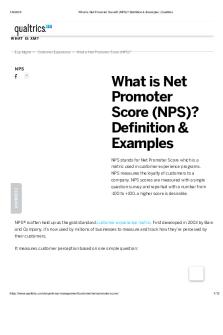Homework 7 - MIS - What is net neutrality? Who’s in favor of net neutrality? Who’s opposed? PDF

| Title | Homework 7 - MIS - What is net neutrality? Who’s in favor of net neutrality? Who’s opposed? |
|---|---|
| Author | Nikhil Maru |
| Course | Management Information Systems |
| Institution | Saginaw Valley State University |
| Pages | 1 |
| File Size | 51.7 KB |
| File Type | |
| Total Downloads | 45 |
| Total Views | 114 |
Summary
MIS - What is net neutrality? Who’s in favor of net neutrality? Who’s opposed? Why - Internet Service Provider (ISP) such as BT or Comcast could influence what a user is able to see h...
Description
MGT 325 Homework 7
Question: What is net neutrality? Who’s in favor of net neutrality? Who’s opposed? Why
Net neutrality is the concept of treating the access to the internet content and applications in a fair and equal manner to all different types of consumers. Without net neutrality your Internet Service Provider (ISP) such as BT or Comcast could influence what a user is able to see how quickly you could see it. In order to watch YouTube, browse Facebook or even read the news you need an ISP to connect you that content. Net neutrality demands that ISPs should treat all web traffic the same. If you look at this concept from a reality perspective, the ISPs are the roads between the tech city, where large wealthy corporations like Amazon and Google are based and target the consumers (users) in different homes, offices or other locations. These companies have to send information along this path which is actually owned by the ISPs. The web traffic (data information) travels along this path for both the small users as well as this large tech giants. The ISPs should therefore not favor the corporations over the small users. The Obama administration is in favor of net neutrality while the Trump Administration is trying to eradicate the policy imposed over to the FCC by the Obama Administration. As per the Obama Administration, the ISPs could not discriminate against these users from blocking apps or websites that are legal. They were not allowed to create a sort of distinction between the speeds on these two types of user groups. The thought by the ISPs were that they should make fast lane connections for the tech giants who paid the premium prices for the internet....
Similar Free PDFs

NET Neutrality English Essay
- 3 Pages

Www onlineocr net net
- 1 Pages

Ent Net - Ent Net
- 14 Pages

Chapter 7 Net Taxable Estate
- 11 Pages

Ado-net
- 38 Pages

Whos got the monkey - Ebook HBR
- 9 Pages

Completed net force lab
- 3 Pages

UGC NET Management Syllabus
- 11 Pages

NET - HRM - Syllabus
- 4 Pages
Popular Institutions
- Tinajero National High School - Annex
- Politeknik Caltex Riau
- Yokohama City University
- SGT University
- University of Al-Qadisiyah
- Divine Word College of Vigan
- Techniek College Rotterdam
- Universidade de Santiago
- Universiti Teknologi MARA Cawangan Johor Kampus Pasir Gudang
- Poltekkes Kemenkes Yogyakarta
- Baguio City National High School
- Colegio san marcos
- preparatoria uno
- Centro de Bachillerato Tecnológico Industrial y de Servicios No. 107
- Dalian Maritime University
- Quang Trung Secondary School
- Colegio Tecnológico en Informática
- Corporación Regional de Educación Superior
- Grupo CEDVA
- Dar Al Uloom University
- Centro de Estudios Preuniversitarios de la Universidad Nacional de Ingeniería
- 上智大学
- Aakash International School, Nuna Majara
- San Felipe Neri Catholic School
- Kang Chiao International School - New Taipei City
- Misamis Occidental National High School
- Institución Educativa Escuela Normal Juan Ladrilleros
- Kolehiyo ng Pantukan
- Batanes State College
- Instituto Continental
- Sekolah Menengah Kejuruan Kesehatan Kaltara (Tarakan)
- Colegio de La Inmaculada Concepcion - Cebu






